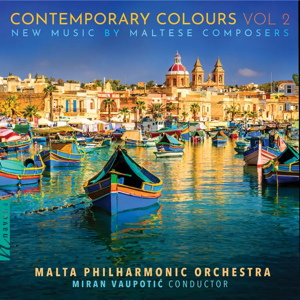
Contemporary Colours Volume 2 • New Music by Maltese Composers
Malta Philharmonic Orchestra / Miran Vaupotić
rec. 2023, Catholic Institute, Floriana, Malta
Navona NV6664 [58]
Which Maltese composers may you have come across? Well, possibly Charles Camilleri (1931-2009), who spent much of his life in London. When I was in Malta in 1999, I heard Ġgantija, a long symphonic poem by John Galea (b.1937), named after a celebrated megalithic temple complex.
The disc comes only with some dull information about the orchestra’s achievements, but nothing about the composers or the music. Luckily, the label’s site for this disc is most helpful.
The programme begins with a burst of full-bloodied romanticism in Kris Spiteri’s Longing. Not even the gentler contrasting section, with rippling piano figurations, takes away the feeling a film score extract. Spiteri has worked in the world of music theatre. (He co-wrote Porn – the Musical, which in 2015 won the Best New Musical at the Off West End Award.)
The Elegy by Steven-Joseph Psaila may remind you of Finzi or Vaughan Williams, and that is no bad thing. It is scored for strings, in part muted. Although the piece is in no way English pastoral, it inhabits a similar language.
I found Josef Bugeja’s Crux very impressive. It starts darkly in woodwind and harp, and then there comes rising tension and tempo created via chromatic harmonies and powerful brass writing. The piece hits a climax, and falls into a positive major-key ending in triumph. I was not surprised when I read that the composer took inspiration from biblical and sacred sources. The work was first performed in 2007.
The Adagio No.2 by Joseph Sammut is, unsurprisingly, a work with a solemn tread. It is mostly homophonic and tonal, and reaches a tense climax. Sammut, one of the founders of the Malta Philharmonic, was a much-respected figure. The work is dedicated to all those who died in the Covid-19 pandemic.
Albert Pace is represented by his 2012 work Two Episodes from Antigone. He studied with Camilleri, and composed in many forms. On this evidence, his music may be eclectic but uniquely atmospheric at times. There is a real sense of space, aided by a modality of line which seems almost Eastern in influence. The orchestration is clear and evocative. As far as I can tell, these two pieces come from a larger work about Antigone’s tragic story.
There is compelling, driving rhythmic energy in the action-packed five minutes of Ruben Zahra’s The Forbidden IV. Having heard brief extracts from some of his theatre and film scores, one need not be too surprised that there is an in-built drama in his orchestral writing.
I felt that there was the calm before the storm at the beginning of Kristian Schembri’s Cataclysmus. The next three minutes was the cataclysm itself in all its power; the last two minutes reflected the devastation. You know this sort of scene from the tragedies we see daily on the television news. This is a fine work, but not comfortable listening. The composer, who is also a percussionist, is now based in the USA.
The disc closes with Reuben Pace’s Waiting for Godot. At nine minutes, this is largely quiet and reflective, with just occasional harsh jabbing chords. The textures constantly overlap, reminding me a little of Luigi Nono. Pace’s music is often performed in Malta, and has been played by the BBC NOW. Unfortunately, apart from the fact that the music has no clear form, no beginning or ending point, I cannot account for the title. It just is.
An enterprising disc then, mostly well recorded, and all nine pieces have considerable interest.
Gary Higginson
Buying this recording via the link below generates revenue for MWI, which helps the site remain free.

Contents
Kris Spiteri (b.1977)
Longing
Steven-Joseph Psaila (b.1984)
Elegy
Josef Bugeja (b.?)
Crux
Joseph Sammut (1926-2024)
Adagio No.2 Op.40
Albert Pace (b.1958)
Two Episodes from ‘Antigone’
Reuben Zahra (b.1972)
The Forbidden IV
Kristian Schembri (b.1990)
Caraclysmus
Reuben Pace (b.1974)
Waiting for Godot

















